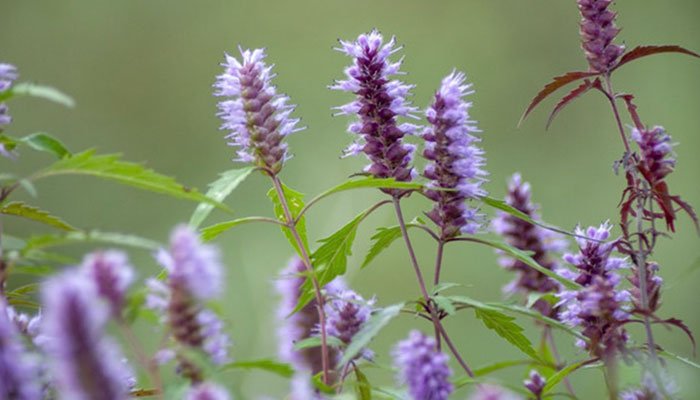What Is Xiang Ru
Xiang Ru is commonly known as Mosla Chinensis, which is an annual herb belonging to the family Labiatae. It first appeared in <Mingyi Bie Lu> around 420-589 AD.
This plant likes an environment that is warm, humid, sunny, and abundant in rainfall. They grow well in sheltered, sunny, well-drained, loose sandy loam or red loam soil. They often grow on grassy slopes or forests below 1,400 meters above sea level. They can be found in China, Japan, Korea, and Vietnam.
In summer and autumn, people gather the above-ground parts of Mosla chinensis, remove impurities, dry them in the shade, cut them into sections, and make them into Chinese herbal medicines.

Xiang Ru contains a lot of volatile oil, and its components include benzaldehyde, acetophenone, paeonol, p-isopropyltoluene, 4-terpinenol, camphene, linalool, artemisia triene, dihydro cuminyl alcohol, verbenol, phellandrene, β-myrcene, α-terpinene, α-thujene, β-thujene, pinene, p-cymene, sylvestrene, eucalyptol, cineole, 5-allylguaiacol, dl-limonene, sabinol, ocimene, isopulegol, carvacrol, thymol, myristicin, methyl thymol ether, elemicin, caryophyllene, caryophyllene, palmitic acid, phytone, and phytol.
In addition, it also contains baicalein-7-methylether, luteolin, quercetin, chrysoeriol, apigenin, oroxylin A, kaempferol, glucopyranosides, adenosine, glucoside, furocoumarine, diketopiperazines, and some trace elements.
Generally, the tender Xiang Ru with green leaves, lavender stems, and a strong fragrance is preferred. Chewing good quality Xiang Ru will make your tongue feel slightly numb.
According to <Compendium of Materia Medica>, the medicinal nature of Xiang Ru is slightly warm, with a pungent taste. It has a certain therapeutic effect on pathological changes of the lung, spleen, and stomach meridians.
In traditional Chinese medicine, it is often used to promote sweating and relieve exterior symptoms, remove dampness to regulate stomach, induce diuresis and alleviate edema, treat cold due to summer-heat and dampness, diarrhea, pediatric indigestion, pediatric herpetic pharyngitis, dysuria, aphtha, pulp disease, eczema, beriberi, scabies, vaginal trichomoniasis, acute gastroenteritis, bacillary dysentery, and air condition sickness.
There are more than 50 kinds of Chinese medicine prescriptions containing it, such as Xiang Ru Yin, Huo Xiang Qu Shu Shui, and Chang Yan Ning Pian.
Benefits
- Anti-oxidation, inhibiting lipid peroxidation and scavenging DPPH free radicals.
- Lowering the body temperature of normal mice and the body temperature of yeast-induced fever rats.
- Increasing the pain threshold and reducing the number of writhing mice caused by acetic acid.
- Inhibiting A3 influenza virus, H1N1 influenza virus, and orphan virus in vitro.
- Promoting the proliferation of T lymphocytes and B lymphocytes and enhancing immunity.
- Removing dampness to regulating the stomach, treating fever, aversion to cold, headache with heavy body, anhidrosis, abdominal distension, greasy tongue coating, vomiting, and diarrhea caused by wind-cold and dampness disturbing spleen and stomach.
- Promoting sweating and urination, treating edema, dysuria, and beriberic puffiness.
- Its volatile oil cooperates with pentobarbital sodium to extend the sleep time of experimental mice.
- Inhibiting Staphylococcus aureus, Escherichia coli, Bacillus subtilis, Staphylococcus epidermidis, Shigella dysenteriae, Shigella flexneri, Shigella sonnei, Bacillus typhi, B. paratyphi, Bacillus typhimurium, and Proteus.
Combinations
- It can be used in combination with Hou Po (Magnolia Bark), Jin Yin Hua (Flos Lonicerae), Lian Qiao (Fructus Forsythiae), Bai Bian Dou (White Hyacinth Bean), etc. to treat infantile diarrhea caused by summer-heat and dampness.
- It can be used in combination with Bo He (Mentha), Hou Po (Magnolia Bark), Bai Bian Dou (White Hyacinth Bean), etc. to treat mild hypokalemic soft diseases.
- It can be used in combination with Jin Yin Hua (Flos Lonicerae), Chai Hu (Radix Bupleuri), etc. to treat high fever in children caused by cold in summer.
- It can be used in combination with Guang Huo Xiang (Herba Pogostemonis), Pei Lan (Eupatorium Fortunei), Huang Lian (Rhizoma Coptidis) , etc. to treat vomiting and diarrhea caused by food poisoning.
- It can be used in combination with Tian Zhu Huang (Bamboo Sugar), Chan Tui (Periostracum Cicadae), Ju Hua (Flos Chrysanthemi), Fang Feng (Radix Saposhnikoviae), Huang Qi (Radix Astragali), Jin Yin Hua (Flos Lonicerae), Shui Niu Jiao (Cornu Bubali), etc. to treat acute eczema and chronic eczema.
Side Effects
- At present, there is no literature report that Xiang Ru has toxic effects, and no data is showing that taking it at the prescribed dose can cause serious adverse reactions.
- Individual patients taking it may cause vomiting.
Precautions and Warnings
- The dosage of Xiang Ru should be controlled between 3-10g.
- It can be made into decoctions, pills, powders, or mashed for external use.
- People who are allergic to Xiang Ru should not take it.
- Patients with spontaneous sweating due to exterior deficiency should not take it.
- Pregnant women and breastfeeding women should take it under the guidance of a doctor.
